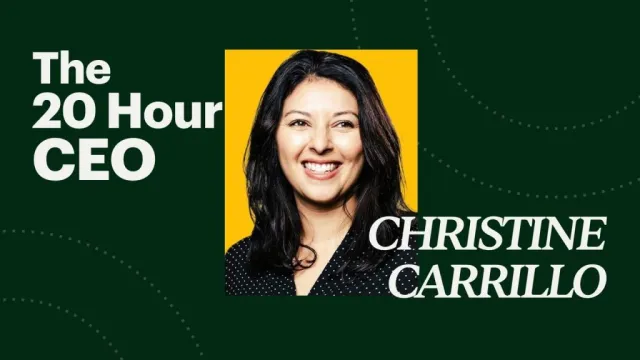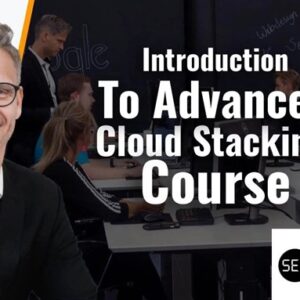Christine Carrillo – The 20 Hour CEO
$1,000.00 Original price was: $1,000.00.$35.00Current price is: $35.00.
- Delivery: You Will Receive A Receipt With Download Link Through Email.
- If you need more proof ofcourse, feel free to chat with me!

Sales Page: https://products.christinecarrillo.com/the-20-hour-ceo-video
Delivery Time: Instant DownloadDescription
Table of Contents
ToggleEscape the Founder Trap- The 20 Hour CEO Carillo Blueprint to Freedom. The allure of entrepreneurship often comes with the unspoken expectation of constant hustle, blurring the lines between personal life and business operations. However, Christine Carrillo’s 20 hour CEO Carillo approach offers a compelling alternative, teaching founders how to build a business that thrives even when they’re not constantly on call, allowing them to reclaim their time and focus on strategic growth.
Building a Machine, Not Just a Job
The central tenet of the 20 Hour CEO philosophy is the concept of transforming your business into a well-oiled machine capable of operating efficiently without requiring constant intervention from its founder. It’s a fundamental shift in perspective, moving away from treating the business as an extension of oneself and toward creating a self-sustaining entity. This foundational concept is crucial for any founder dreaming of a truly scalable enterprise.
The CEO as Architect, Not Construction Worker
Many entrepreneurs fall into the trap of believing they must be involved in every single aspect of their business. They are the ones making the coffee, fixing the printer, answering all the emails and selling their products or services. This mindset often results in burnout and prevents the business from reaching its full potential. For this reason, the 20 Hour CEO approach emphasizes the CEO’s role as an architect or an engineer of the business. The CEO’s responsibilities lie in designing and building the systems and processes that will allow the business as a whole to function effectively and efficiently. Instead of being an individual contributor, they become the orchestrator of growth, designing the very infrastructure upon which the business is built. The focus shifts to strategy, planning, and high-level decision making. This involves thinking long-term, identifying opportunities, and fostering a culture of continuous improvement. It requires the CEO to step away from the daily grind and focus on the big picture, which is challenging for many entrepreneurs who have historically built their businesses through relentless hard work and granular daily execution. It’s a shift from reacting to the daily chaos to proactively shaping the future of the business. This change can be difficult but with tools and frameworks in place, the path to scalability opens up and freedom becomes a new possibility.

Breaking Free from Operational Overwhelm
The constant engagement in operational tasks essentially turns the CEO into the single bottleneck in the entire business. Every decision must funnel through them, every problem requires their attention, and this reliance stymies the company’s ability to grow. The 20 hour CEO Carillo course addresses this directly by teaching founders how to detach from the individual tasks that keep them bogged down and instead prioritize them in building robust processes. It’s not about shirking responsibility, but about distributing it wisely. This involves identifying repetitive assignments, tasks that can be automated, and processes that can be systemized for team members that are better suited to handle these functions. It can feel uncomfortable handing off these tasks, especially tasks you enjoy doing, but it’s an essential practice for scalability. It is a calculated move towards empowerment and allowing other members of the organization to contribute their unique perspective and skills. When the CEO is no longer the primary point of contact for everything, the business can become faster and more responsive and the team becomes a reliable mechanism that’s less dependent on one single individual. In doing so, a CEO that is willing to put their ego aside can build sustainable growth and an amazing company culture.
The Danger of the Indispensable CEO
A business that relies heavily on its CEO is essentially a business exposed to great risk. If that CEO suddenly became ill, had to take leave for personal reasons, or simply burned out, the business would suffer. It is like setting a house of cards, with each level dependent on the one right below it. This makes a business very fragile and susceptible to instability. It is the reason why the 20 Hour CEO program emphasizes the importance of the CEO building themselves out of the day-to-day operation. This involves establishing clear processes, documenting them, and training others to manage the operational tasks and be prepared for any situation. The objective is to create a resilient business where key operations can continue with minimized disruption, even without the founder’s direct involvement. By delegating effectively and enabling strong operational procedures the business transforms from a vulnerable entity into a robust and sustainable operation, capable of navigating the uncertainties of its industry and changing operational needs. This not only secures the long-term viability of the company but frees the CEO to focus their energy and attention to growing it and expanding its reach and product offering.
Scaling Yourself to Scale Your Business
Before a business can achieve significant growth, the founder themselves must first undergo a transformation. This is not just a matter of learning how to delegate or improving time management; it’s a deep journey of internal growth and change. It is a realization that personal capacity directly impacts the business’s potential. The 20 hour CEO Carillo method prioritizes this personal shift before scaling any operations, underscoring the importance of the leader’s self-development as the primary driver of overall business success.
Focusing on High-Leverage Activities
One of the most significant shifts for a founder learning to become a 20 hour CEO Carillo is the ability to discern high-leverage activities from the low-value tasks that fill up most typical workdays. It encourages CEOs to prioritize “the 10% that matters”—the activities that yield the highest returns for the company’s growth. This requires a ruthlessly critical look at how time is spent and where your effort yields the greatest results. It’s about moving away from simply being busy and towards being strategically effective. This means focusing on activities like strategic planning, market analysis, key partnerships, and fostering strong relationships with the team. These actions can help expand and ensure long-term sustainability of business. The high-impact tasks for any given company will always be constantly evolving depending on its stage of development. At each stage different activities and decisions will be much more strategic than others, allowing that business to navigate its growth and achieve its goals. It is about constantly reevaluating the allocation of time and energy, making the most of the precious time we all have.
The Mindset of the Strategic Leader
Transitioning to a 20 hour CEO Carillo requires not just learning new operational skills, but adopting a different mindset. It’s about moving away from being a reactive executor of tasks, and becoming a proactive facilitator of growth. This mindset is all about seeing the big picture, anticipating challenges, and having a clear vision of where the company is going. It means developing a long-term strategic perspective to ensure the business can achieve its potential. This mindset emphasizes the importance of mentorship, learning, and constant self-improvement. It also includes a recognition that the business’s success is tied to the growth and development of the leader. This strategic mindset is not a switch. It evolves over time, refining its focus on growth and leveraging the combined efforts of the team. This creates a business that is resilient and innovative, capable of navigating the complex challenges of building a successful company. It’s a mindset that says the business is a vehicle for personal growth, and the personal growth of the leader is a vital element to the business’s overall effectiveness and long term stability.
Expanding Personal Capacity
The idea of scaling oneself isn’t about working more hours, it’s about increasing personal effectiveness and capacity for decision quality. It focuses on optimizing your focus, enhancing your time management skills, and creating more mental space. It’s about getting the most out of your workday and your personal time. This may involve learning new skills and habits such as effective delegation, mindful communication, or even taking deliberate breaks. It’s also about optimizing your environment to support productivity and well-being, both inside the business and outside in one’s personal life. It’s recognizing that personal limitations have a direct impact on the organization. It is a commitment to personal growth that results in improved leadership, enhanced resilience, and a greater capacity to steer the business successfully towards growth and stability. By investing in your self-improvement, you’re not just improving yourself, but increasing the business value as a whole, building a stronger and more resilient foundation. You cannot give what you don’t have. This process needs to be a priority.
Leverage and Delegation: The Power Duo of the 20 Hour CEO
Leverage goes beyond simply delegating tasks to others. It is strategically using resources and systems to achieve more with less effort. This means creating roles and operating methods to minimize the time the leader spends on daily tasks. When combined with effective delegation strategies, a CEO reclaims their time by focusing on high-level strategic activities, instead of being bogged down in the weeds of the daily operations. The program highlights that delegation is not simply about unloading the tasks, but assigning the right tasks to the right individuals while building trust and reliability from your team members. The two ideas are key to creating an environment where all team members have autonomy, and ownership, allowing for greater efficiency and a more empowered team.
The Strategic Value of an Executive Assistant
The 20 hour CEO Carillo method places a significant emphasis on the strategic use of an Executive Assistant (EA). A well-utilized EA is not simply an administrative assistant who coordinates calendars and book travel; they become a strategic business partner who provides crucial support and leverage to the CEO. The EA can manage email, handle routine communication, and organize daily workflows, freeing the CEO to focus on more strategic high-value tasks, and ensuring nothing gets missed in the day-to-day. An EA should be seen as an extension of the CEO, an operational arm so that the CEO can maintain focus and clarity throughout the workday. It requires the CEO to trust the EA’s capabilities and be transparent in the expectations of the role itself. The course provides playbooks and frameworks for finding and onboarding the right EA, but it also outlines how to most effectively delegate tasks and build a trusting relationship based on clearly defined expectations for both sides. Ultimately, the EA’s performance and efficiency translates directly into the CEO’s time reclaimed. The right EA can be a game changer for busy entrepreneurs and a strategic step towards greater efficiency which will translate to overall increases in business growth and stability as a whole.
Delegation Beyond the EA
While a strategic EA is a powerful leverage tool, true delegation goes much further. It is about creating a system of empowered team members who are equipped and trusted to make decisions within their roles. In this concept, the 20 hour CEO Carillo program teaches CEOs how to delegate responsibilities throughout their organization using clear communication, defined expectations, and well-established processes. This process must also include a level of trust that the delegated task will be completed with ownership, using the pre-defined systems that allow individual team members to execute effectively every time. It’s about fostering an organizational culture where every team member is motivated and driven to use their unique talents to contribute to the overall goals of the company, without direct supervision from the founder. By distributing responsibilities wisely, CEOs build strong teams that are not dependent on the founder’s constant direction, which allows the business to run efficiently and the CEO to free up their time by not having them in the bottleneck. Delegation, in this context, is about creating an ecosystem of empowered individuals, enhancing the overall organizational capacity.
Cultivating a Culture of Ownership
Effective delegation is not simply about transferring tasks, but about fostering a culture of ownership. This involves allowing space for team members to use their own judgement and make decisions autonomously, within the guidelines previously established. The 20 Hour CEO method trains leaders on how to create an environment in which employees, not only feel empowered but valued and responsible for their contributions. It requires the CEO to be open to giving constructive feedback, offering guidance and mentorship, not direct or micromanagement, especially when there are mistakes. A culture of ownership is tied directly to establishing clear metrics that demonstrate the overall impact of their work within the company. The more trust, accountability, and individual ownership are fostered in the company, the smoother the operations become. Every team member starts to develop and use their own problem-solving skills, which directly contributes to the business overall ability to navigate its challenges successfully, independent of direct CEO interference. This not only enables more efficient workflows, but allows the organization to become more autonomous, freeing the CEO to focus on strategic development.
Systemization: Creating the Self-Running Business
Systematization is more than just creating documented processes; it’s about building a business where operations are predictable, reliable, and independent of constant CEO supervision. The 20 hour CEO Carillo curriculum places a strong focus on creating “systems that run your business for you.” This includes documenting workflows, establishing standard operating procedures, and using automation tools. These systems are not merely static guidelines; they are the dynamic gears that allow a business to grow with minimal disruption. These systems are what takes daily repetition and transforms it into consistent efficient and effective operations. Building a reliable business model that requires minimal direct engagement.
Building Frameworks for Efficiency
Creating effective business frameworks is essential for any company aspiring to operate effectively within the 20 hour work week model. This includes documenting every aspect of the operations, from sales processes, to onboarding new employees, and everything in between. The goal here is to identify those areas of business and tasks that are performed over and over, and finding ways to create a process that allows team members to complete their work most effectively and efficiently. This involves going step by step from the beginning to the end of each process, mapping out all the necessary components and actions. Once every aspect is documented, the next is creating the system that can be effectively and consistently repeated. These frameworks help everyone understand their specific roles, the steps for daily operations, and the expected outcomes. Framework creation requires constant evaluation, adjustments, and improvements, so that they become a foundation for a more reliable organization overall. These frameworks act as the blueprint for consistent business operation.
Automating Repetitive Tasks
Once processes are clearly defined and documented, the next step in this program is to start using technological automation. This involves exploring various software and tools already in place or readily available, to streamline operations. This can also include implementing tools that reduce unnecessary manual efforts, and reduce room for error. Software tools are readily available for data entry, email marketing, accounting, customer management, and beyond, reducing the need to allocate resources to those repetitive tasks. By automating these business operations allows team members to focus on more complex and strategic work and not getting stuck doing repetitive actions. The use of automation also prevents human error and improves response times for various customer inquiries. Implementation of automation doesn’t need to be an all or nothing investment. It can start with any process that is taking a significant amount of time and resources. It is a process of continuous optimization that frees up valuable resources and enhances the productivity of everyone in the organization.
The Predictability of Systems
The ultimate payoff of focusing on systemization is greater predictability, reliability, and scalability within the business model. When all processes, documentation, and operations are in place, they are not dependent on the direct intervention of the founder. This increases overall reliability within the business because daily operations are always being completed the same way, every single time. This consistency is what customers come to expect and provides a dependable foundation for effective long term growth. Systemization allows businesses to replicate successes, ensuring effective consistent scaling, especially in new locations or regions. With processes, systems, and automation firmly in place, the company can increase its production outputs and grow with greater ease and confidence. This predictability also reduces internal stress and potential bottlenecks, allowing team members and leadership to focus on strategic planning and development, and not getting bogged down in the weeds of daily operations.
Prioritization and Focus: Maximizing Impact
Prioritization is about strategically selecting where to dedicate your time and energy. An essential component of this program is to give your energy to those actions and choices that will have the greatest overall return. This approach is essential for any leader looking to make the most of their 20 hour work week. It is a shift in mindset of being busy doing tasks, to focusing efforts in high impact activities that will produce the optimum returns. Ultimately this is about ruthlessly eliminating any and all distractions and focusing energy on the tasks that matter and will lead the business to greater overall success.
Identifying High-Value Activities
The 20 Hour CEO program stresses that not all tasks are created equal. It also stresses the need for founders to become skilled in identifying those activities that are high-value versus the general tasks that take a lot of time and energy with very minimum benefit. It is a skill to know which actions are those that will move the needle of the business forward, and learning to put time and energy there, not at the things that are simply keeping you busy. This involves analysis of how your workday is spent, identifying those repetitive tasks and determining their overall necessity, and the overall cost versus benefit. This practice usually involves looking at how much time is spent in meetings, administrative tasks, answering emails, and the daily to-do list that takes you away from your strategic activities. Once the high-value activities are clear, the next step is to create processes and systems for everything else, leaving CEO available to focus on the high-value activities which require more focus, attention, and strategic guidance.
The Art of Ruthless Elimination
A necessary practice of this method is the art of ruthless task elimination. This means getting rid of those tasks that are not providing significant value to the business, no matter how much pleasure the founder may derive from that task. It requires the CEO to take an objective look at the time spent on all daily activities, and finding where the greatest improvements can be made. This means getting rid of things that are repetitive, menial and can be completely eliminated without hurting the overall operation. This practice also includes learning to say “no” to any task or activity that it is not aligned with the long-term strategic and financial goals of the company. It also includes getting comfortable outsourcing those tasks that might be necessary but don’t use your highest level of skill and focus. The act of ruthless task elimination provides more time and focus for essential high value activities and those tasks that have more impact to the business bottom line.
Focus and Energy Management
Prioritization goes beyond task management; it also includes personal energy management. It’s about becoming aware of your personal energy levels, and planning your day accordingly. This means scheduling high-value activities at those moments of the day when you are most focused and energized. It also means ensuring that at other times of the day, you are focusing on lower-impact activities that require less focus or delegation. Effective energy management also involves making sure that you are taking enough time off for self-care, personal time, and rest, while not working more than 20 hours a week. This level of focus allows you to approach your work with more clarity and purpose. This ensures that you maintain your health, and prevent burn-out especially during those peak periods. By planning around your peak energy cycles, you are maximizing productivity without draining personal resources. It also focuses on balancing mental and physical well-being along with the business’s needs.
Efficient Decision Making: Reducing the Overwhelm
As an entrepreneur, the ability to make quick and accurate decisions is crucial for sustainable business growth. With all the information coming at you, decision fatigue can set in quickly. The 20 hour CEO Carillo philosophy introduces decision-making frameworks designed to streamline this process, reducing over-analysis and ensuring that choices are aligned with the business’s overarching objectives. Effective decision making not only reduces personal stress, it creates a smooth operation with greater agility.
Frameworks for Quick Decisions
The speed and accuracy of your decision making can determine the company’s ultimate success. The 20 hour CEO Carillo approach emphasizes the need for using effective decision making frameworks that include clear guidelines and a process for evaluating all available options. These frameworks should promote speed and accuracy, not long drawn out processes that create decision fatigue. One of the components might include assigning a particular question to a particular individual in the organization who has the technical expertise to answer it efficiently and effectively. The goal is to minimize emotional responses when making critical business decisions by establishing predefined metrics and criteria for effective evaluation. It is not always about achieving perfection, but about making decisive choices that are aligned with the company’s goals and overall strategic direction. These frameworks encourage making decision faster, which translates to fewer bottlenecks and greater overall efficiency throughout all company operations.
Reducing Over-Analysis
Overthinking is a common challenge for many business leaders. It can stall progress and create unnecessary delays in every day business operations. The 20 hour CEO Carillo course promotes the practice of setting time limitations for all decision making, to avoid any form of paralysis by over analysis. This is done by following pre set guidelines and the decision making frameworks. This involves understanding that sometimes “good enough” is the best approach within a set timeline. It also encourages trusting the expertise and knowledge of all the team members. By learning when to disengage from over examining problems, allows you to streamline the decision making process and increase overall efficiency. It also requires you to accept that you may not always have 100% of every piece of information, but that the decision is still made with the best information available at that time, and can be adjusted as needed. The goal is to create a bias toward action, and move the business forward efficiently.
The Role of Intuition and Experience
While frameworks are essential, the 20 hour CEO Carillo philosophy also acknowledges the role of intuition and past experiences. By trusting your gut and past experiences, can streamline fast and effective decision making. These are lessons learned in your field and in your experiences that aren’t always replicable in any analytical model. These are the accumulated insights that can enhance your ability to make a swift and effective choice. This balance of analytical frameworks with intuitive insight allows for decisions that are both data-driven and insightful, resulting in more effective business growth and personal confidence as a leader. This doesn’t always mean the decision wil be perfect, but it can be adjusted later. Effective leaders trust their business instincts and this allows for better decision making overall.
Conclusion
The 20 hour CEO Carillo program isn’t just about working less; it’s about working smarter. It’s about taking a strategic approach to entrepreneurship, ensuring that the business is serving the founder, and not the other way around. As the program wisely notes: “If your business can’t operate without you 90% of the time, you don’t have a business – you just have a job”. It is a call to action for business owners to transform the way they engage with their businesses and themselves, to a sustainable, and profitable model of living and building a successful enterprise. It guides business leaders to focus their efforts on the strategic elements that drive long term growth, stability and overall personal freedom, while leaving the day-to-day operations to run smoothly on its own. The ultimate goal is not only to build a successful company, but also to build a business that reflects your values, goals, and aspirations, all while maintaining a healthy, happy personal life.
Related products
-
Sale!

Jesper Nissen – Advanced Cloudstack For SEO Course
$197.00Original price was: $197.00.$24.50Current price is: $24.50. -
Sale!

Clare Le Roy – Notion and Creators Canva Template Bundle
$528.00Original price was: $528.00.$25.00Current price is: $25.00. -
Sale!

Justin Brooke – Growth Operator Blueprint
$995.00Original price was: $995.00.$30.00Current price is: $30.00. -
Sale!

John Assaraf Top Programs – Winning The Game Of Money 2024
$1,497.00Original price was: $1,497.00.$39.00Current price is: $39.00.

Reviews
There are no reviews yet.